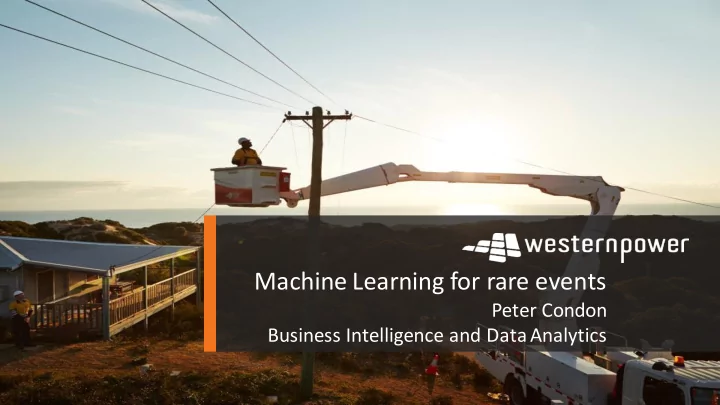

Machine Learning for rare events Peter Condon Business Intelligence and Data Analytics
Today’s presentation Problem definition Data discovery and transformation Model building and selection State of play 2
Who we are State Government-owned corporation that builds, maintains and operates electricity network throughout majority of south Western Australia Governed by an independent Board and reports to Minister for Energy, as owner’s representative Serving more than one million customers across a network area of 254,920 km2 Customer-orientated organisation that provides a safe, reliable and affordable electricity supply to Western Australians Provides an essential service through transmission and distribution of electricity across our vast infrastructure of poles, wires, substations and depots 3
What we do The network grid is made up Generators Retailers issue accounts of transmission and make electricity to collect revenue for distribution assets. at power plants. the whole supply chain. The network enables electricity to flow from generators to consumers. 4
Problem definition
Problem definition 1 Pole top fires affect any tiny fraction of the network each year, but occasionally cluster geographically and temporally Modelling of pole top fires has traditionally been for proactive maintenance There is anecdotal evidence of leading indicators, however a formal short term forecast could allow for more fault crews to be available when needed 6
Pole top fire definition 1 “ Pole top fires occur when the electrical energy from leakage currents between any two phases and/or between any phase and earth passing through conductive paths in the pole top components, generates sufficient localised heat to ignite or char flammable cross-arm and/or pole material, nominally timber. ” - Electricity Networks Association 7
Why does a pole top fire occur? Weather patterns – Dust build up – Light rain Asset condition – Insulator defects – Cross-arm defects – Voltage 8
Data discovery and transformation
Pre-existing datasets Pole top fire master list Weather observations and forecasts – Temperature, humidity, rain, wind, and air pressure NRMT risk – Insulator model Unexplained outages – Recloser trips and unknown cause outages 10
Unavailable Datasets 2 Wind gust forecast Air quality – Particulate matter 11
Collating the Data 2 Collate incidents and risk factors by feeder – 950 feeders across the network offer natural grouping based on network topology Aggregate to nearest weather station – 17 weather stations with sufficient historic observations and forecasts 12
Model building and selection
Fail fast 2 Deterministic functional form (Proc NLIN) – Too many combinations of factors (gave up after 25 million iterations) Generalised Additive Model (Proc GAM) – Over fitting issues AutoNeural(Enterprise Miner) – Unable to optimise on so few non zero targets 14
Gradient Boosting pros 2 Actually worked – After increasing default Node Sample Fast – Run time typically measured in minutes to a couple of hours No need to specify data interactions 15
Gradient Boosting cons 2 Limited explicability – Scoring code and variable importance lists can be difficult to interpret Art to hyperparameter tuning – Setting N Iterations too high or too low will lead to a poor model 16
Model Selection 2 Weather stations cover large geographic areas – Fires may occur during relatively benign conditions at point of measurement Actual predictions from the model cover a very small range (e.g. between 0 and 0.03) Champion model deemed to be the one that does the best job of ranking riskiest days 17
State of play
Model validation 2 Seven independent models are being scored each day A champion model will be selected in November for display over summer Next steps to be reviewed in April 19
Dashboard 2 20
Dashboard 2 21
Dashboard 2 22
Electricity Networks Corporation trading as Western Power ABN 18 540 492 861 24/7 Emergency Line 13 13 51 General Enquires 13 10 87 TTY 1800 13 13 51 TIS 13 14 50 Email enquiry@westernpower.com.au Website westernpower.com.au
Recommend
More recommend